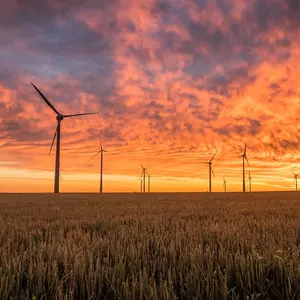
6 tips for saving energy at home
Earth Overshoot Day marks the day every year when the amount of resources consumed by humans exceeds the amount that can be naturally renewed. From this day forwards, the Earth cannot naturally provide the resources required for the rest of the year in a renewable manner.
Six tips for saving valuable energy in your home
The ecological footprint of a household is calculated from the per capita consumption. Heat and water consumption are the most important factors that make up almost half of all final energy consumption in Germany. Traffic accounts for around 30% and electricity for around 21% of our power consumption.
The following energy-saving tips can help you to reduce your consumption of heat, water and electricity and, consequently, lower your CO2 emissions. In this way, you are doing your bit for the energy transition.
Tip 1: Heat your home efficiently and save energy
You can optimise your heating and use less fuel and electricity if you improve the efficiency level of your system. This factor indicates the efficiency of a heating system and is given as a percentage.
The efficiency of a conventional oil heating system is between 70 and 90%, and gas heating systems are between 85 and 93%. Energy is lost, for example, due to material wear and deposits of pollutants in the heating system.
Sludge can accumulate in radiators and rust, and slag deposits can form in boilers. In contrast, modern gas condensing boiler systems and oil condensing boiler systems utilise the energy in the waste gas that is produced during combustion. This makes them more effective and can result in efficiency levels of up to 100%.
You should also observe the following points to improve the efficiency of your heating system:
- Choose a heating system of the correct size (suitable for your interior volume)
- Use modern control technology
- Hydronic balancing
- Watch your room temperatures
Efficient gas or oil heating systems can also be combined with renewable energies, such as heat pumps or solar thermal technology. This makes heating your home even more efficient and, above all, more environmentally friendly. For example, WOLF solar heating systems can be used as central heating backup and are suitable for DHW heating.
Tip 2: Optimise the insulation of the building and heating pipes
Heating efficiency can be impaired by obsolete systems and by heat lost from your boiler and piping. It is important to insulate your building and piping sufficiently to prevent the loss of heat.
Good insulation means that the heating system has to produce less heat, burns less fossil fuel and therefore produces fewer CO2 emissions.
The heat transfer coefficient of the insulation materials used is the most important parameter. Further energy is lost through the windows. Modern thermal imaging cameras can generate a thermal profile of your building to be used in the energy-efficient renovation of your home.
Tip 3: Save money with a smart home
In smart homes, you can manage your energy consumption or meter readings digitally, for instance using the WOLF Smartset app. This lets you keep an eye on your consumption. Further advantages of smart homes that contribute to lowering energy consumption are:
- Smart homes only switch on the heating when you are actually using the rooms and are at home.
- You can control the temperature automatically by weekday, time of day and room. This saves a great deal of energy in the house and is very convenient.
- You can choose between various settings, such as energy-saving mode and holiday mode.
- You can also control your ventilation system easily using the app and save valuable energy that would have been lost by manual airing in winter.
Tip 4: Use water sparingly in your household
If you also reduce the amount of water you use, you can save even more energy in your home. The following measures can help:
- Shower instead of bathing: filling a bathtub with water takes around 12.5 minutes but we only shower for an average of six minutes
- Use energy-saving taps and fittings: these can reduce the flow rate by around half
- Do not use the prewash cycle of your washing machine: this lowers the electricity consumption by around 10%. Instead, pretreat stains before putting the laundry in the machine for washing
- Use rain water: you can use rainwater to flush toilets and water your garden
Tip 5: Save energy at home by using modern household appliances
Modern household appliances, such as energy-efficient fridges or washing machines use less water and electricity. This reduces your energy costs to a minimum. Note the following tips:
- Choose electrical appliances with an efficiency class of A to A+++
- Avoid using stand-by mode and instead switch off the appliances
- Use energy-saving lightbulbs to save electricity
- Use a smart home system
- Install a modern temperature control system
Tip 6: Air your home properly
It is important to air your home every day to create the perfect indoor climate. However, this can waste a great deal of heat, especially in winter. To save energy at home, you should air your rooms fully and briefly at regular intervals (do not leave the windows tilted or cracked open).
Airing your home in short bursts is very simple and particularly effective for reducing high indoor humidity (e.g. after doing laundry). To do so, open your windows wide instead of tilting or cracking them open. Keep the door closed when doing this, otherwise the moisture will simply be distributed even further through the interior. If the humidity in the rooms is not too high, you can also cross-ventilate to draw fresh air into your home.
Modern ventilation systems are a convenient alternative to airing your home manually. Heat-recovery ventilation systems are not only effective at preventing the formation of mould, they also drastically reduce your heating bills.


